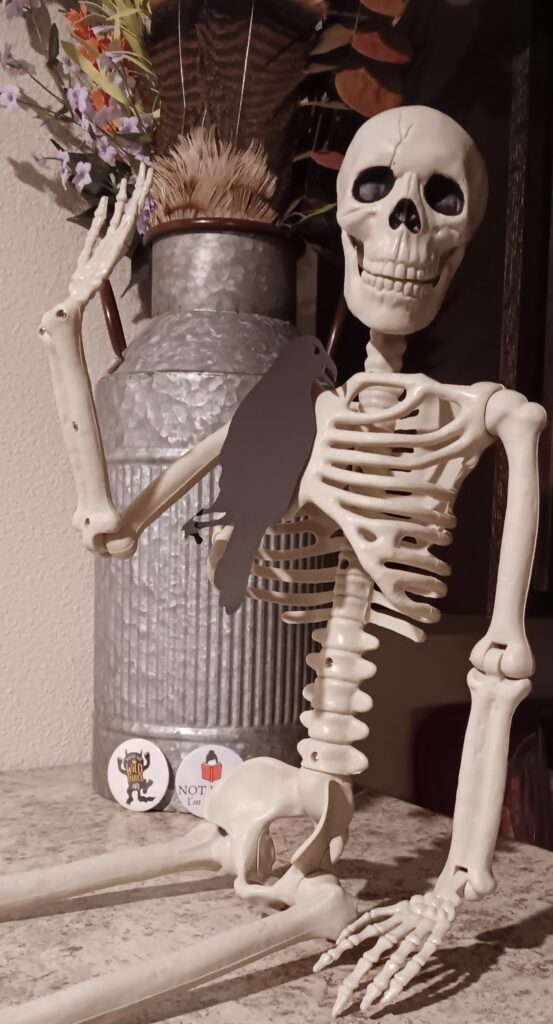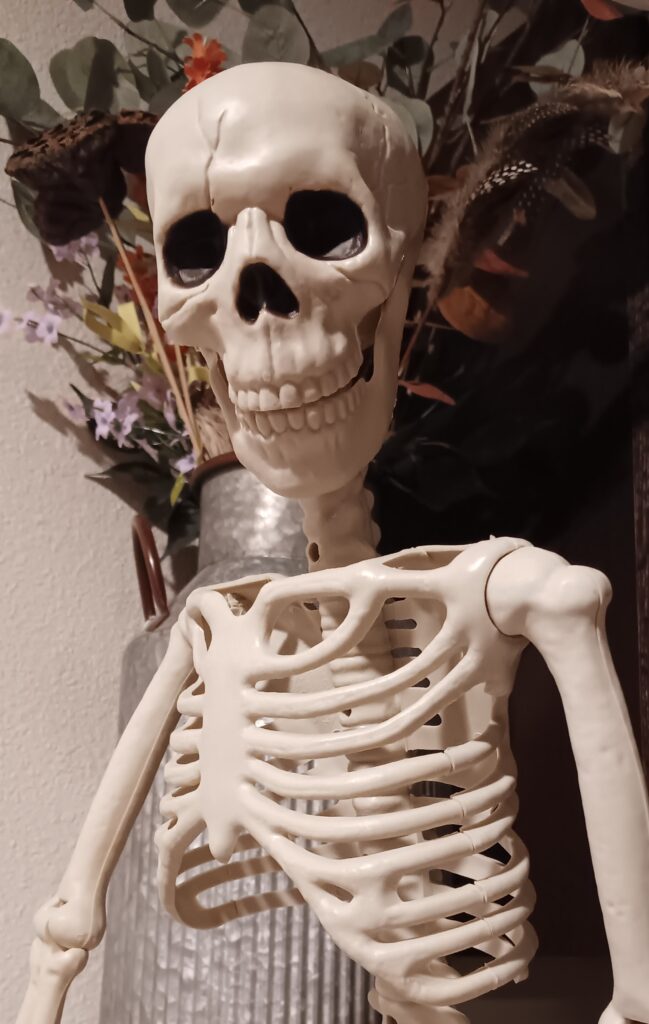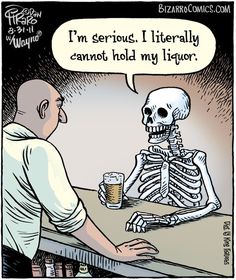Today, I’m interviewing my writing muse, who also helps me learn about the human body—muscles, tendons, nerves, and lots about bones.
RH: Fred, tell me about the bones of writing.
FRED: Thank you for shooting into the heart of this interview.
I’m quoting David Baldacci. “Scenes should be powerful…chapters should be fluid and complex.” “Small scenes make great novels.”
David Mamet instructs, “Write dialogue in a rhythmic way. Human speech is rhythmic.” When I had better vision, I’d sit in a crowded place, for example the stagecoach depot—they tore that down—and I could tell what the conversations were about by the way people waved their hands, the look on their faces, reactions to tears. “Write dialogue,” says David, and I’m paraphrasing cuz life’s too short, write dialogue so readers don’t “fight against the current”.
Margaret Atwood suggests creating a table of what happened in the world so you know your characters ages during important historical events. Say for instance around 1893.
RH: 1893? Please elaborate.
FRED: Cheesman Park and the Botanical Gardens—south of Denver—now sit on what was once Mount Prospect Cemetery. Despicable. Political. Scandal.

RH: Explain.
FRED: The idea to transform the cemetery into a park came about via complaints from nearby residents. Why’d they move there in the first place?
Meanwhile, the then mayor was out of town. Second, the silver boom ended and the federal government repealed the Sherman (Silver) Act.
RH: I appreciate the history lesson. So, what happened?
FRED: Riverside Cemetery accepted most of the deceased. I’d say there’re roughly a thousand bodies still buried there. Majority of the citizens opposed the method, especially those in the Health Department. What if Yellow Fever resurfaced? Or smallpox?
RH: Did families of the interred agree to this?
FRED: Politicians gave families 90 days to remove their dearly departed. With the silver crash, not many had money for such a thing. They’d already paid! Those conniving fellows. Undertaker, E.P. McGovern for instance, worked out a below the ground deal. Government budgeted $10,000 for the removal of an estimated 5,000 bodies from Mt. Prospect. McGovern, friend of the acting mayor, got the job. But got paid per casket.
RH: About two-dollars per body?
FRED: For an honest man. To make more money, McGovern broke bones of the dead—including decapitations—and fit pieces of two or more bodies into a child’s casket. Therefore, the number of coffins increased, as did the money in his greedy pockets. May they all get holes.
RH: Your different size bones. They make sense now. Sorry, my thoughts just scattered.
FRED: Better your thoughts than your head.
RH: (I shut off the recorder and composed myself.) Fred, how important is the opening of a story?
FRED: The Inciting Incident and/or the Opening Hook are critical. Begin with tension. If your first few pages don’t entice readers to continue, you’re dead in the water.
RH: What should an author know about their characters?
FRED: Everything! William Wordsworth said, “The Child is father of the Man.” If you don’t know your characters, their backgrounds, desires, dislikes, they why’s, etcetera, how will your readers? How will your character(s) story arc? Especially in a mystery. Like mine. Nobody ever found who shot me.
RH: You died via a bullet?
FRED: Yes, ma’am. Now, this brings me to the core of a story.
RH: But….
FRED: Hang on to your bucket. Conflict is the essential part of a great story. Here’s a link I found. Typing on your keyboard is like ticklin’ ivories.
https://www.writersdigest.com/publishing-insights/the-essential-parts-of-a-novel-synopsis
“Tortured by grief and loss (person vs. self) and fleeing a wrong conviction for a crime he didn’t commit (person vs. society), DR. RICHARD KIMBALL struggles to survive (person vs. nature) while fleeing the relentless lawman who pursues him (person vs. person).
Wrongful conviction my…. Wrongful death is more like it.
RH: What happened to you?
FRED: There I was, reading this forever long book when I asked myself, what does this chapter have to do with anything? That’s when the shot rang out. A bullet through the window.
RH: OH MY GOSH!
FRED: Hold your horses. We’ll backtrack in a minute. The thought of necessary vs overdone occurred to me when I was hanging at a book store on East Colfax—which is a good gig for someone like me. Anyway, ask yourself, does this scene move the story ahead?
RH: Excellent point. Why did somebody shoot you?

FRED: Suppose it could be two or three reasons. Forgive and forget is what my granny always said. Now, two more things. Make the emotions memorable. And write a satisfying ending. If you don’t, your story’ll be six feet under.
RH: I’m a bit dumbfounded.
FRED: How do you think I felt when they dug me up?
RH: I…a, um, appreciate your time.
FRED: Got plenty.
RH: Happy Skel-o-ween.
FRED: Real funny.
RH: Thank you for joining us for this episode of Fiction, History, or Both?
Featured cartoon courtesy of imgur.com.
Denver Public Library Digital Collections
https://cdm16079.contentdm.oclc.org/digital/collection/p15330coll4/id/1900/rec/7

